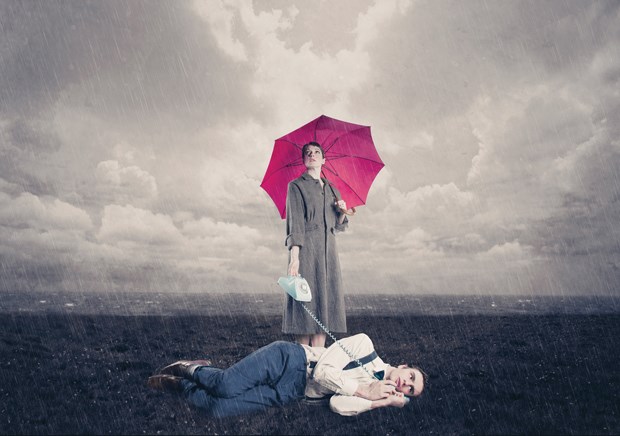UBC Theatre presents Eurydice by Sarah Ruhl, until Feb. 6 at the Frederic Wood Theatre at UBC. Tickets: $24.50/$16.50/$11.50 at ubctheatretickets.com or 604-822-2678.
In Eurydice, American playwright Sarah Ruhl refreshes an ancient Greek myth with a modern setting and a change of perspective.
The original tale of Orpheus and Eurydice follows legendary musician and poet Orpheus in his quest to retrieve his beloved wife from the underworld, but Ruhl's 2003 work imagines the tragic love story from the point of view of the lesser-known mythological figure, Eurydice, and brings the characters into the 20th century.
"This is a contemporary retelling of the Orpheus myth," says North Vancouver resident Daniel Curalli, a second year BFA student who is playing Orpheus in UBC Theatre's production of Eurydice. "This one is modernized, set in an ambiguous period between the 1920s and 1950s, and the cool thing about this story is that it takes the myth and kind of flips it on its head."
Directed by second-year MFA directing candidate Keltie Forsyth, the play follows its titular character (played by Curalli's fellow BFA student Kelsey Ranshaw) who has died and entered the underworld.
"We all know what happens to Orpheus, but what happens to Eurydice, who's his wife, while she's waiting?" In keeping with its origins, the play maintains the existence of an underworld that humans can enter freely, but the costumes, sets and use of language suggest modern times. Ruhl also made several changes to the original storyline, including the introduction of a new character, Eurydice's father. Ruhl actually wrote Eurydice in honour of her own dad, who died of cancer in 1994 when she was 20 years old. In her play, Eurydice meets her long-deceased father in the underworld and, as she has lost her memory, he tries to teach her about her past.
"He tells Eurydice a lot of stories that we know (Ruhl's) father told her, and these are stories that she would have heard from her father and that she's put into the script as kind of a memorial of him," Curalli explains.
At the crux of the story is Eurydice's struggle to choose whether to return to the land of the living or remain in the underworld.
"She has to make the decision at the end about whether she wants to stay with the father or whether she wants to go back with her husband and that leads to the climactic moment in the play," Curalli says.
Retelling the Orpheus and Eurydice myth from a different perspective adds a new dimension to the story and portrays Eurydice as far more complex than simply a captive in need of rescue.
"In the original myth, when you read it, Eurydice almost comes across as an object," Curalli says. "In this one, we really get to see the human side of her and we really identify with her as being a person who's making her own decisions and also has an incredible sense of agency."
In preparing to take on the role of Orpheus, Curalli tapped into the music prodigy side of his character. Orpheus hears music constantly, Curalli explains, to the point that it pulls him away from the people around him, including his wife.
"In his relationship with Eurydice, it's not that he does not love Eurydice, it's that he hears music in his head that describes her so beautifully and so perfectly, but he can't put it into words and it draws him away from her," he says. "Finding that dimension to the character is interesting."
Over the course of play, Orpheus learns to better express himself through words and develops from a boyish character into a mature grown up who loves selflessly.
"At the end, we get to a point where everyone realizes that to love is to want the best for the other person, and I think that that's the beauty of the play and the beauty of the journey that Orpheus takes."



